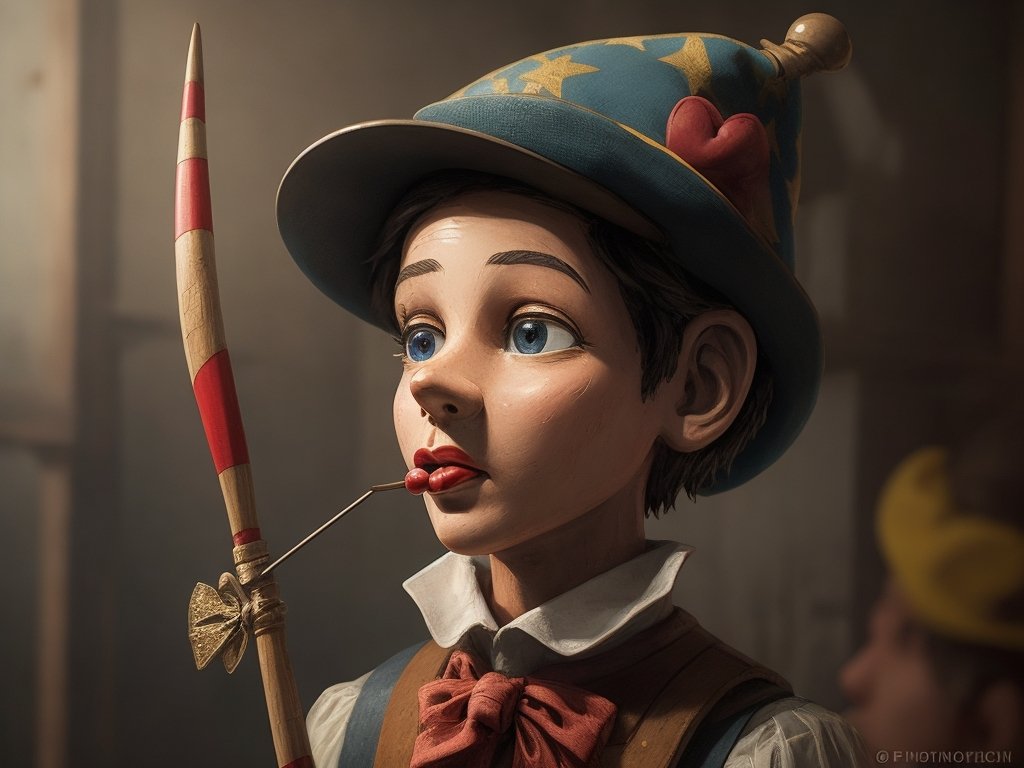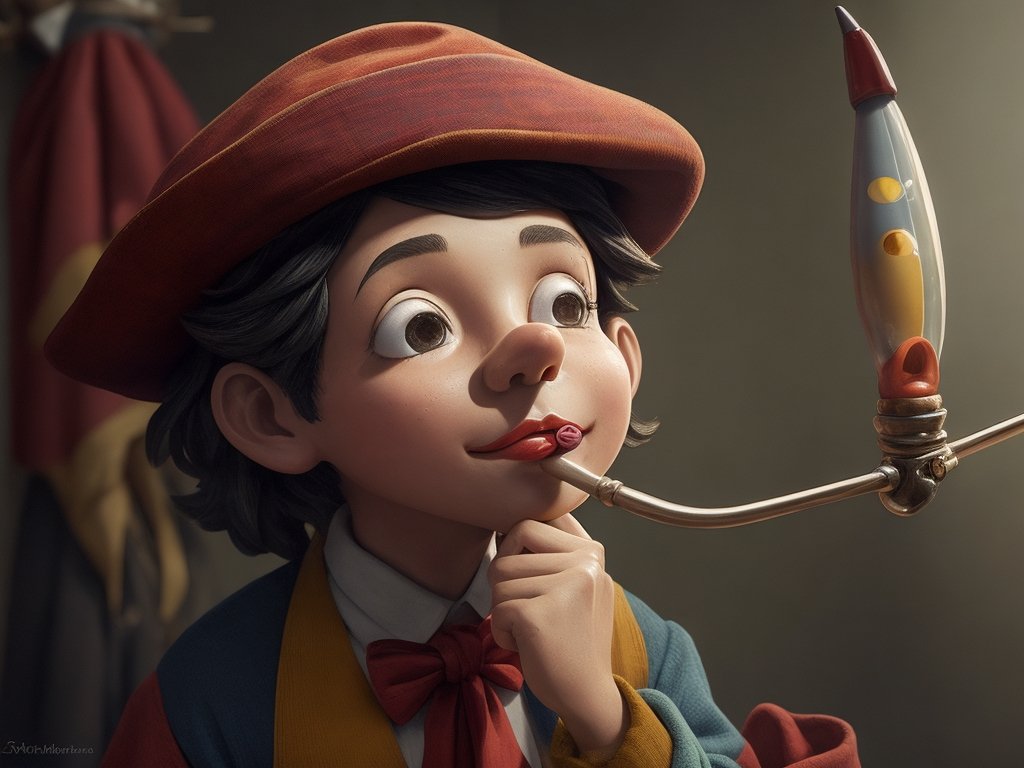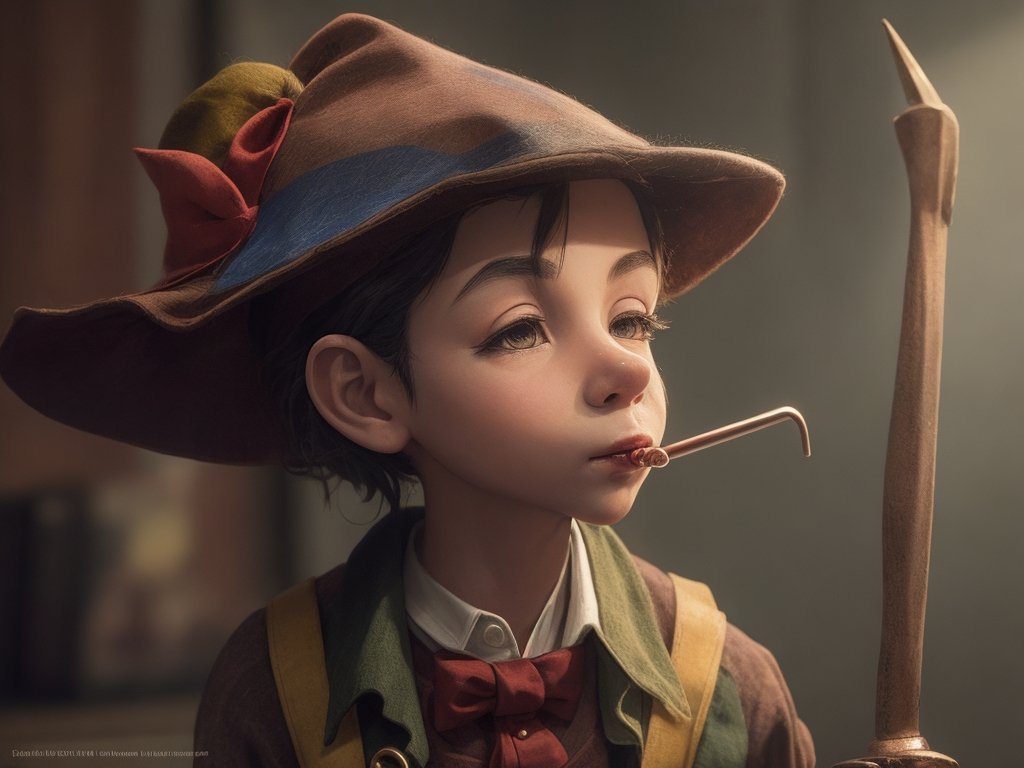Pinocchio Spiritual Meaning- Find Out The Profound Meaning
Pinocchio’s spiritual meaning lies in its allegorical exploration of transformation and morality. The journey of the puppet becoming a real boy symbolizes the human quest for personal growth, authenticity, and moral development. It highlights the power of choices and their consequences, encouraging self-discovery and the pursuit of truth.
Imagine a world where wooden puppets yearn to be real, where choices shape destinies, and morality is the compass guiding transformation. Pinocchio, the beloved tale that transcends generations, holds a hidden treasure trove of spiritual wisdom.
As we delve into its layers, we uncover a profound allegory of growth, authenticity, and the pursuit of truth. The puppet’s evolution into a boy mirrors our own quest for genuine self-discovery.
Join us on a thought-provoking expedition as we unravel the intricate threads of Pinocchio’s narrative, revealing insights that resonate deeply with the essence of our own existence.
Key Takeaways
- Pinocchio’s evolution mirrors personal development driven by decisions.
- Story emphasizes ethical choices and their outcomes.
- The puppet-to-boy transition signifies self-discovery and truth-seeking.
- Consequences underline accountability and maturation.
- Pinocchio parallels our spiritual quest for growth.

What Does Pinocchio Mean Spiritually?
Pinocchio’s enchanting tale transcends its surface narrative, holding profound spiritual implications that resonate across cultures and beliefs. Within its whimsical facade lies a treasure trove of symbolic depth, each facet contributing to its rich spiritual meaning.
A Journey of Transformation
Pinocchio’s transformation from puppet to human encapsulates a universal spiritual journey of growth and self-realization. Just as the wooden puppet aspires to become real, we too embark on a quest for authenticity and genuine identity, shedding falsehoods along the way.
Ethical Navigation
The story’s emphasis on choices and consequences speaks to our moral compass, echoing spiritual teachings about the significance of ethical decision-making. Pinocchio’s encounters with temptations and challenges mirror our own struggles to navigate the intricacies of right and wrong.
Quest for Truth and Self-Discovery
Pinocchio’s pursuit of truth mirrors the spiritual quest for deeper understanding and self-discovery. His journey reflects the innate human desire to unearth hidden wisdom, transcending mere physical existence.
Lessons of Accountability
As Pinocchio grapples with the outcomes of his actions, we are reminded of the spiritual principle of accountability. The story underscores that our choices shape our path, mirroring the idea that our intentions and deeds have far-reaching implications.
Embracing Inner Transformation
At its core, Pinocchio embodies the eternal theme of inner transformation. His evolution serves as a mirror to our own spiritual growth, encouraging us to explore our true essence and strive for a deeper connection with the world around us.
In the symphony of puppet strings and human desires, Pinocchio’s spiritual meaning resonates, inviting us to reflect on our own journey, choices, and the profound truths that lie within.
5 Interpretations Of The Spiritual Meaning Of Pinocchio
Unlocking the hidden depths of Pinocchio’s tale unveils a tapestry of spiritual meanings that resonate across cultures and beliefs.
Beyond its enchanting storyline lies a realm of interpretation, where the puppet’s journey transcends wood and strings, and becomes a profound allegory for our own spiritual quests.
| Interpretation | Description |
| Symbol of Transformation | Pinocchio’s evolution from puppet to human mirrors the spiritual journey of growth and authenticity. |
| Moral Compass | The story underscores ethical choices and their consequences, aligning with spiritual teachings. |
| Quest for Truth | Pinocchio’s pursuit of truth reflects the universal spiritual quest for deeper understanding. |
| Lessons of Accountability | The narrative highlights the principle of accountability, resonating with spiritual concepts of karma. |
| Inner Transformation | Pinocchio’s transformation parallels our own spiritual growth, encouraging exploration of true self. |
In the intricate interplay of strings and choices, Pinocchio’s story emerges as a timeless vessel of spiritual wisdom. Each interpretation weaves a unique thread into the fabric of transformation, morality, and self-discovery. As we navigate life’s intricate path, the wooden puppet’s journey serves as a guidepost, reminding us of the profound lessons ingrained within the layers of its narrative.

Spiritual Meaning Of Pinocchio In Different Cultures
As Pinocchio’s strings dance to life’s rhythms, so too does its spiritual essence resonate across the global stage.
Beyond geographical boundaries, the tale of the wooden puppet embarking on a transformative journey finds its place in diverse cultures, each weaving unique interpretations into the narrative’s rich tapestry.
| Culture | Interpretation |
| Italian | Pinocchio embodies the journey from falsehood to truth, echoing spiritual growth and moral discovery. |
| Eastern | The puppet’s transformation reflects the path of enlightenment, resonating with concepts of rebirth. |
| Native American | Pinocchio symbolizes the quest for harmony with nature, aligning with indigenous connections to spirits. |
| Eastern European | The tale mirrors the struggle between good and evil, echoing age-old battles depicted in folklore. |
| African | Pinocchio’s evolution signifies the balance between ancestral wisdom and personal growth, vital in Africa. |
Italian
In its homeland, Pinocchio’s spiritual meaning intertwines with cultural values of truth and growth. The journey from puppet to real boy embodies the Italian pursuit of authenticity and self-awareness.
Just as the puppet’s nose grows with falsehoods, individuals are encouraged to shed pretenses and embrace honesty as a path to spiritual enrichment. The narrative echoes the moral discovery intrinsic to Italian spirituality, where one’s evolution parallels Pinocchio’s quest for truth.
Eastern
Pinocchio’s tale finds resonance in Eastern cultures, where the puppet’s transformation mirrors the journey to enlightenment. Just as the wooden puppet evolves into a human, individuals strive to transcend their limitations and awaken to higher states of consciousness.
This metamorphosis aligns with concepts of rebirth and the cyclical nature of existence, underpinning Eastern spiritual philosophies. Pinocchio’s narrative becomes a metaphor for shedding illusions and embracing the essence of one’s true self.
Native American
Pinocchio’s spiritual significance resonates with Native American cultures, embodying the pursuit of harmony between humanity and nature. The puppet’s journey from inanimate object to sentient being parallels indigenous beliefs in the interconnectedness of all life forms.
The tale aligns with their reverence for spirits and nature, emphasizing the need for balance and respect. Pinocchio’s transformation symbolizes the crucial connection between the human journey and the world’s spiritual fabric.
Eastern European
In Eastern European cultures, Pinocchio’s narrative mirrors age-old battles between good and evil depicted in folklore. The puppet’s encounters with challenges and temptations echo the eternal struggle between darkness and light.
Pinocchio’s evolution into a real boy serves as a testament to the triumph of virtue over vice, reflecting the region’s cultural and spiritual values of resilience and moral integrity.
African
In African cultures, Pinocchio’s story embodies the equilibrium between ancestral wisdom and personal growth. Just as the puppet navigates a world of fantastical beings, Africans embrace their diverse spiritual heritage while seeking individual evolution.
Pinocchio’s journey resonates with the importance of honoring one’s roots while pursuing self-discovery, aligning with African spirituality’s emphasis on collective identity and individual empowerment.
What Does Seeing Pinocchio In A Dream Mean Spiritually?
When Pinocchio emerges within the realm of dreams, its presence carries profound spiritual implications that extend beyond the wooden puppet’s whimsical exterior. In the theater of the subconscious, this iconic character takes on a symbolic role, offering insights into the deeper facets of our inner world.
A Journey of Self-Discovery and Authenticity
Seeing Pinocchio in a dream can be an invitation to embark on a personal odyssey of self-discovery. Just as the puppet evolves from wood to flesh, the dream may signify your own quest for authenticity and a more profound understanding of your true self.
This encounter encourages you to peel back the layers of pretense and connect with the core of your being, aligning with spiritual teachings that emphasize the importance of living in alignment with your genuine nature.
The Power of Choices and Moral Reflection
Pinocchio’s journey is fraught with choices and their consequences, and encountering him in a dream can serve as a reminder of the moral fabric that weaves through our lives. Your dream might highlight the significance of ethical decision-making and the ripple effects these choices create.
Just as Pinocchio’s actions shape his transformation, your dream experience encourages you to consider the impact of your choices on your own spiritual evolution and the lives of those around you.
Navigating Challenges and Embracing Growth
In the realm of dreams, Pinocchio’s encounters with challenges and adversities mirror our waking life struggles. This dream scenario could be interpreted as an affirmation of your resilience and ability to navigate difficulties with grace and courage.
Pinocchio’s transformation from a puppet to a real boy resonates with your journey of growth and transformation, emphasizing the importance of facing challenges head-on and emerging stronger and more authentic.
Embracing Truth and Authenticity
Seeing Pinocchio in a dream may also underscore the value of living a life of truth and honesty. Just as Pinocchio’s nose grows when he lies, your dream experience could symbolize the consequences of not being true to yourself or others.
This interpretation aligns with spiritual teachings that emphasize the significance of transparency, integrity, and genuine interactions.
When Pinocchio steps onto the stage of your dreams, it carries a script of spiritual messages that speak to your growth, choices, authenticity, and moral compass. This dream encounter invites you to explore the dimensions of your own journey and align your waking life with the timeless wisdom embedded in the puppet’s transformative story.

Brief History Of Pinocchio As A Cultural Icon
Pinocchio, the enchanting wooden puppet, has journeyed through time to become a cultural icon of remarkable significance. Originating from the pages of an Italian children’s novel, Pinocchio has undergone a transformation that transcends generations and borders.
Late 19th Century: Birth of a Tale
The story of Pinocchio was born in 1883, crafted by the Italian author Carlo Collodi. Originally titled “The Adventures of Pinocchio,” the novel introduced the mischievous puppet who longed to be human. Collodi’s creation was an allegory of moral lessons, blending whimsy with insightful exploration of character and choices.
Early 20th Century: Silver Screen Debut
Pinocchio’s journey extended to the silver screen in 1940 when Walt Disney brought the puppet to life in an animated masterpiece. Disney’s adaptation catapulted Pinocchio into the global spotlight, introducing the character to a diverse audience and solidifying his place in popular culture.
Mid-20th Century: Iconic Imagery
Pinocchio’s image became synonymous with childhood wonder and the pursuit of dreams. His iconic image adorned various merchandise, from toys to posters, further solidifying his status as a beloved cultural emblem.
Late 20th Century: Cultural Adaptations
As the world evolved, Pinocchio’s story remained relevant. Numerous adaptations across literature, theater, and film reimagined the puppet’s journey through diverse cultural lenses, making his narrative a canvas for exploring universal themes.
21st Century: Resonating Beyond Borders
Pinocchio’s allure continued well into the 21st century. His story’s timeless messages of growth, authenticity, and ethical exploration resonated across cultures, fostering connections between generations and sparking conversations about life’s profound lessons.
Pinocchio’s journey from pages to screens, transcending linguistic and cultural boundaries, has cemented his status as a cultural icon. As an allegory for personal growth, moral understanding, and the pursuit of authenticity, Pinocchio’s legacy endures as a reminder of the power of storytelling to shape and unite societies worldwide.
The Relevance Of Pinocchio As A Spiritual Symbol For Modern Society
In our rapidly evolving modern society, Pinocchio emerges as a beacon of spiritual significance, offering timeless wisdom that resonates with the complexities of contemporary life.
Authenticity in an Age of Masks
In a world often dominated by façades and superficiality, Pinocchio’s journey from puppet to real boy serves as a profound reminder of the importance of authenticity. The puppet’s quest to shed his wooden exterior mirrors our own yearning for genuine connections and the courage to embrace our true selves amidst societal pressures.
Navigating Ethical Crossroads
Pinocchio’s encounters with moral dilemmas mirror the ethical complexities of today’s globalized world. His story prompts us to consider the consequences of our actions, urging us to navigate the intricate web of choices with heightened moral awareness. In an era where choices ripple far beyond individual lives, Pinocchio’s tale underscores the imperative of mindful decision-making.
Inner Transformation in a Materialistic Era
As modern life becomes increasingly materialistic and fast-paced, Pinocchio’s transformation offers a parallel to our internal growth amidst external chaos. The puppet’s evolution from an inanimate object to a sentient being echoes our collective aspiration to cultivate inner richness and mindfulness, navigating the clamor of the external world with inner equilibrium.
Technology’s Impact on Identity
In the digital age, where virtual personas can obscure genuine identities, Pinocchio’s narrative takes on new relevance. His yearning to shed his wooden limitations aligns with our digital footprint and online personas. The puppet’s evolution resonates with our quest to bridge the gap between our virtual and authentic selves.
Global Lessons in Unity
As Pinocchio’s story transcends cultural boundaries, it serves as a reminder of our shared human experience. In a world grappling with divisions, his narrative promotes unity through the universal themes of growth, morality, and authenticity. Pinocchio’s tale fosters connections across diverse cultures, reinforcing our common quest for spiritual evolution.
In modern society, Pinocchio remains an indomitable spiritual symbol. His tale’s ability to transcend eras, cultures, and technological advances showcases the enduring relevance of its messages. As we navigate the complexities of our contemporary world, Pinocchio’s wooden exterior conceals a spiritual core that speaks to our universal pursuit of authenticity, ethical responsibility, and inner transformation.

Pinocchio’s Representation In Different Mythology
Pinocchio, with its universal themes of transformation and authenticity, finds echoes across diverse mythologies, enriching the cultural tapestry with its allegorical resonance.
Greek Mythology: Pygmalion and Galatea
The myth of Pygmalion and Galatea from ancient Greece mirrors Pinocchio’s narrative. In both stories, an artist’s creation is brought to life, revealing the power of creative intention and the desire for a deeper connection.
Just as Pinocchio’s evolution signifies growth, Pygmalion’s sculpted statue transforming into a living woman represents the profound link between artistic creation and life itself.
Norse Mythology: The Creation of Mankind
In Norse mythology, the tale of Ask and Embla, the first human couple, reflects Pinocchio’s emergence as a sentient being. As Odin, Vili, and Vé shape humans from wood and ash, Ask and Embla symbolize the transition from lifeless forms to conscious existence.
This parallels Pinocchio’s transformation from a puppet into a boy, emphasizing the spiritual essence inherent in the act of creation.
Egyptian Mythology: Transformation of Osiris
The story of Osiris, the Egyptian god of the afterlife, echoes Pinocchio’s narrative of resurrection and rebirth. Just as Osiris undergoes a transformation after death, Pinocchio’s wooden form metamorphoses into a real human.
Both tales emphasize the cyclical nature of existence, highlighting the potential for growth and renewal after periods of challenge.
Hindu Mythology: The Story of Ganesha
Ganesha, the elephant-headed deity in Hindu mythology, embodies the fusion of human and animal forms, paralleling Pinocchio’s journey from puppet to human.
Ganesha’s symbolism of overcoming obstacles and embracing diverse aspects of existence resonates with Pinocchio’s quest for authenticity, reinforcing the idea that embracing one’s unique identity leads to growth.
Native American Mythology:Transformation and Ancestral Wisdom
Pinocchio’s evolution aligns with Native American mythology’s themes of transformation and connection with ancestral spirits. Just as Pinocchio navigates encounters with magical creatures, Native American mythologies feature shape-shifters and spirits guiding humans toward self-discovery.
Both narratives emphasize the balance between personal growth and reverence for ancient wisdom.
Pinocchio’s timeless narrative, woven with threads of transformation and authenticity, finds a place amidst the diverse mythologies of the world. Across cultures and epochs, the wooden puppet’s journey echoes universal human experiences, speaking to the spiritual quest for self-discovery, growth, and connection with the profound mysteries of existence.
FAQ’s
What can we learn from Pinocchio’s moral dilemmas?
Pinocchio’s choices and consequences serve as reminders of the ethical fabric guiding our own lives, highlighting the importance of mindful decisions.
How does Pinocchio resonate with modern society’s challenges?
In a world of masks and materialism, Pinocchio’s narrative inspires authenticity and inner growth amid external complexities.
Why is Pinocchio’s story timeless across cultures?
Pinocchio’s universal themes of transformation and morality transcend borders, fostering connections and discussions about life’s deeper lessons.
How does Pinocchio address the concept of truth?
Pinocchio’s quest for truth underscores the significance of genuine interactions, aligning with spiritual teachings of transparency and integrity.
What role does choice play in Pinocchio’s spiritual meaning?
Choices define Pinocchio’s journey and our own paths, emphasizing the impact of decisions on our growth and moral development.
Summary
Pinocchio’s spiritual journey resonates as a guiding light in our complex world. Embrace authenticity, make choices aligned with values, and seek growth through challenges.
Remember, like Pinocchio, our stories unfold uniquely, yet the universal themes of truth, morality, and transformation bind us. Let his allegorical lessons inspire profound self-discovery, fostering connections and illuminating paths towards a richer, more meaningful existence.